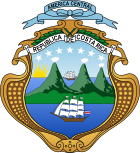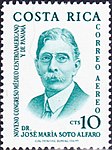| |||||||||||||||||
|
| |||||||||||||||||
Presidential election | |||||||||||||||||
| |||||||||||||||||
| |||||||||||||||||
 |
|---|
|
|
General elections were held in Costa Rica on 7 December 1919. [1] Julio Acosta García of the Constitutional Party won the presidential election, whilst the party also won the parliamentary election, in which they received 75% of the vote. [2]
These elections were held after dictator Federico Tinoco was deposed and exiled. The winning candidate Acosta, former chancellor of the government overthrown by Tinoco, had been precisely one of his fierce opponents and leader of armed antitinoquist groups which earned him great popularity, this despite the fact that his affiliation as a Freemason and Theosophist were controversial, at least among some sectors of the Church. [3]
The tinoquismo grouped around the recently founded Democratic Party and nominates Dr. José Maria Soto Alfaro, denoted tinoquista, twice deputy and brother of former president Bernardo Soto Alfaro. Soto was also the founder of the so-called "Club 27 de Enero" (27 January Club) whose name commemorated the Tinoquista coup on 27 January 1917 that overthrew González Flores and was one of the supporters of the Tinoquista regime. [4]
Results
President
| Candidate | Party | Votes | % | |
|---|---|---|---|---|
| Julio Acosta García | Constitutional Party | 43,283 | 89.85 | |
| José María Soto | Democratic Party | 4,884 | 10.14 | |
| Francisco Aguilar Barquero | 3 | 0.01 | ||
| Alberto Echandi Montero | 2 | 0.00 | ||
| Alfredo González Flores | 2 | 0.00 | ||
| Total | 48,174 | 100.00 | ||
| Registered voters/turnout | 84,283 | – | ||
| Source: Nohlen, TSE | ||||
By province
| Province | Acosta | Soto | ||||||||
|---|---|---|---|---|---|---|---|---|---|---|
| 12,771 | 774 | |||||||||
| 10,561 | 1,903 | |||||||||
| 8,055 | 84 | |||||||||
| 3,438 | 658 | |||||||||
| 4,177 | 1,076 | |||||||||
| 2,600 | 389 | |||||||||
| 1,681 | 0 | |||||||||
| Total | 43,283 | 4,884 | ||||||||
| Source: TSE | ||||||||||
Parliament
| Party | Votes | % | |
|---|---|---|---|
| Constitutional Party | 26,751 | 74.88 | |
| Democratic Party | 3,014 | 8.44 | |
| Acostista | 2,183 | 6.11 | |
| Constitucional | 1,911 | 5.35 | |
| Unión provincial | 1,123 | 3.14 | |
| Obrero acostista | 616 | 1.72 | |
| Constitucional obrero | 106 | 0.30 | |
| Acostista conciliador | 20 | 0.06 | |
| Total | 35,724 | 100.00 | |
| Valid votes | 35,724 | 99.47 | |
| Invalid/blank votes | 190 | 0.53 | |
| Total votes | 35,914 | 100.00 | |
| Registered voters/turnout | 84,987 | 42.26 | |
| Source: Nohlen | |||
References
- ^ Dieter Nohlen (2005) Elections in the Americas: A data handbook, Volume I, p155 ISBN 978-0-19-928357-6
- ^ Nohlen, p164
- ^ Oconitrillo García, Eduardo (2004). Cien años de política costarricense: 1902-2002, de Ascensión Esquivel a Abel Pacheco. EUNED. ISBN 9789968313605.
- ^ Salazar Mora, Jorge Mario (1995). Crisis liberal y estado reformista: análisis político-electoral (1914-1949). ISBN 9789977672908.
| |||||||||||||||||
|
| |||||||||||||||||
Presidential election | |||||||||||||||||
| |||||||||||||||||
| |||||||||||||||||
 |
|---|
|
|
General elections were held in Costa Rica on 7 December 1919. [1] Julio Acosta García of the Constitutional Party won the presidential election, whilst the party also won the parliamentary election, in which they received 75% of the vote. [2]
These elections were held after dictator Federico Tinoco was deposed and exiled. The winning candidate Acosta, former chancellor of the government overthrown by Tinoco, had been precisely one of his fierce opponents and leader of armed antitinoquist groups which earned him great popularity, this despite the fact that his affiliation as a Freemason and Theosophist were controversial, at least among some sectors of the Church. [3]
The tinoquismo grouped around the recently founded Democratic Party and nominates Dr. José Maria Soto Alfaro, denoted tinoquista, twice deputy and brother of former president Bernardo Soto Alfaro. Soto was also the founder of the so-called "Club 27 de Enero" (27 January Club) whose name commemorated the Tinoquista coup on 27 January 1917 that overthrew González Flores and was one of the supporters of the Tinoquista regime. [4]
Results
President
| Candidate | Party | Votes | % | |
|---|---|---|---|---|
| Julio Acosta García | Constitutional Party | 43,283 | 89.85 | |
| José María Soto | Democratic Party | 4,884 | 10.14 | |
| Francisco Aguilar Barquero | 3 | 0.01 | ||
| Alberto Echandi Montero | 2 | 0.00 | ||
| Alfredo González Flores | 2 | 0.00 | ||
| Total | 48,174 | 100.00 | ||
| Registered voters/turnout | 84,283 | – | ||
| Source: Nohlen, TSE | ||||
By province
| Province | Acosta | Soto | ||||||||
|---|---|---|---|---|---|---|---|---|---|---|
| 12,771 | 774 | |||||||||
| 10,561 | 1,903 | |||||||||
| 8,055 | 84 | |||||||||
| 3,438 | 658 | |||||||||
| 4,177 | 1,076 | |||||||||
| 2,600 | 389 | |||||||||
| 1,681 | 0 | |||||||||
| Total | 43,283 | 4,884 | ||||||||
| Source: TSE | ||||||||||
Parliament
| Party | Votes | % | |
|---|---|---|---|
| Constitutional Party | 26,751 | 74.88 | |
| Democratic Party | 3,014 | 8.44 | |
| Acostista | 2,183 | 6.11 | |
| Constitucional | 1,911 | 5.35 | |
| Unión provincial | 1,123 | 3.14 | |
| Obrero acostista | 616 | 1.72 | |
| Constitucional obrero | 106 | 0.30 | |
| Acostista conciliador | 20 | 0.06 | |
| Total | 35,724 | 100.00 | |
| Valid votes | 35,724 | 99.47 | |
| Invalid/blank votes | 190 | 0.53 | |
| Total votes | 35,914 | 100.00 | |
| Registered voters/turnout | 84,987 | 42.26 | |
| Source: Nohlen | |||
References
- ^ Dieter Nohlen (2005) Elections in the Americas: A data handbook, Volume I, p155 ISBN 978-0-19-928357-6
- ^ Nohlen, p164
- ^ Oconitrillo García, Eduardo (2004). Cien años de política costarricense: 1902-2002, de Ascensión Esquivel a Abel Pacheco. EUNED. ISBN 9789968313605.
- ^ Salazar Mora, Jorge Mario (1995). Crisis liberal y estado reformista: análisis político-electoral (1914-1949). ISBN 9789977672908.

